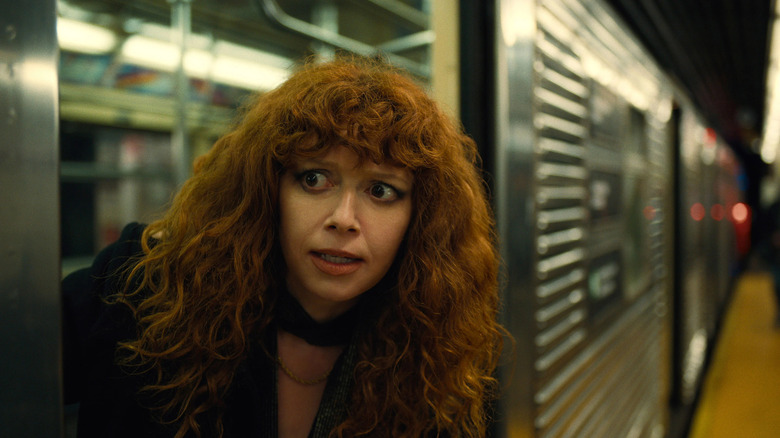
The best movies and shows set in New York City don't capture the spirit of the Big Apple -- they evolve it. The Empire State Building was nicknamed the "Empty State Building" until King Kong scaled it in his eponymous 1933 movie. "Spider-Man" gave New Yorkers "you mess with one of us, you mess with all of us," a phrase that balmed our post-9/11 bruises. And "Russian Doll," the Natasha Lyonne top-lined time-loop comedy that premiered on Netflix three years ago, offered one insane, game-changing re-pronunciation: "cock-a-roach." Lyonne's performance (and Leslye Headland's show by extension) made it impossible to understand New York City as anything but a collection of misfit survivalists. Some have dug into their same neighborhoods for decades. Others are transplants transformed by Brooklyn. Like the cock-a-roach, New Yorkers are survivors who can weather anything. They got through terrorist attacks and survived being the U.S. pandemic's epicenter. Of course, they could handle a time-loop of their death day.
It's not that "Russian Doll" made me and other New Yorkers realize that we'd get past COVID-19, but it did engender the strength to get through terrible days that bled together endlessly. The show has universal appeal, as well. Its first season blended a skewering of millennial culture with classic time-loop and detective fiction tropes. The second season is a time travel story. Like the Big Apple, "Russian Doll" is a melting pot of conventions and genres that encourage broader viewing.
Here are 14 shows to watch if you like "Russian Doll."
Severance
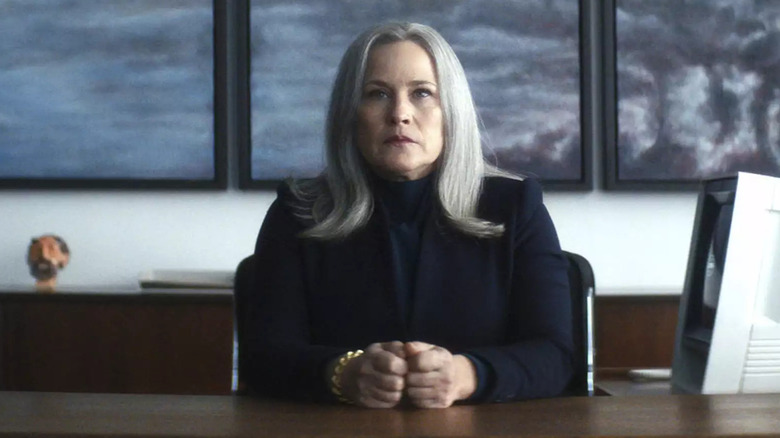
"Severance" is the best show of 2022. With eight months of the year left to go, that's a presumptuous sentence to write in April of 2022. Yet, I would bet every dollar in the Lumin Corporation's overstuffed coffers that anyone who's seen "Severance" would agree with me — at least on principle. What creator-writer Dan Erickson and directors Ben Stiller and Aoife McArdle have done with just one season of television is resuscitate and improve the "mystery box" show by making it a mirror. It is impossible not to see our on-fire year in "Severance." The cultural desire to dissociate is there. The insane demands corporations place on their workers, and the insidious ways they placate them are also there, front and center in the form of dangerous medical procedures and waffle parties. In "Severance," getting gaslighted is a job perk. The fact that such a searingly satirical show is also the best potboiler in years seems nothing short of miraculous.
It's also hysterical, though, which is the reason "Russian Doll" fans should flock to it. Zack Cherry almost hybridizes Natasha Lyonne and Greta Lee, blending droll yet manic energy with savage wit. "Severance" has a similar taste for the odd and suddenly dark (there's an early sequence of sustained, comedic violence that recalls Lyonne's string of absurd deaths in an early "Russian Doll" episode). Most importantly, both shows offer impeccable first seasons that are ready and available to binge right now.
"Severance" is the bar "Russian Doll" Season 2 will try to clear. It would behoove you to become familiar with it.
Bored To Death
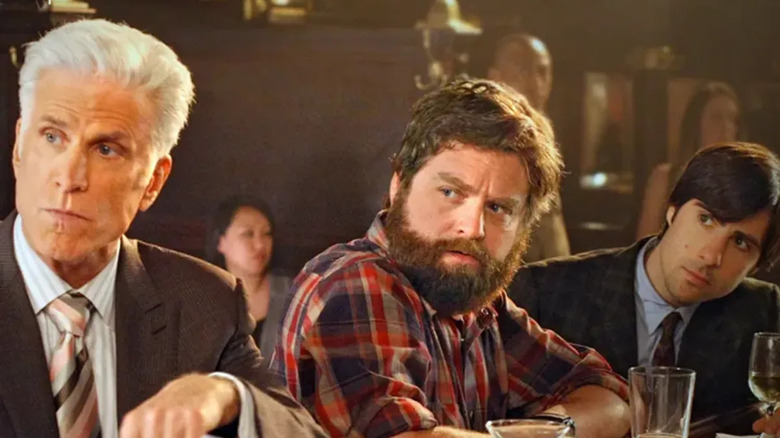
It's easy to imagine the events of "Bored to Death" occurring in tandem with "Russian Doll." On the same night that Natasha Lyonne's Nadia is dying in the shadow of Tompkins Square Park, Jason Schwartzman's Jonathan Ames is snooping out a lead that goes nowhere. Both characters are stuck in ruts. Both play amateur detective to change that. And both are surrounded by a cadre of quirky and vital supporting characters.
With those characters and the cast that plays them (Zack Galifianakis, Ted Danson), it's surprising "Bored to Death" didn't catch on with the zeitgeist. Yes, the Jonathan Ames-created show ran for three seasons. No, it's not very fondly remembered. Unlike "Russian Doll," "Bored To Death" gets off to a rough start (the first season is uneven at best and boring at worst). By the time the show hits its second-season stride, however, it's easy to see it as a forebearer for the many beloved New York comedies that would follow it, from "Girls" to "Russian Doll" to "Search Party."
"Bored to Death," like its protagonists, was working out the kinks of its braver, better impulses. It eventually did. That makes it a must-watch for fans of "Russian Doll" or alt-comedy in general.
Loki
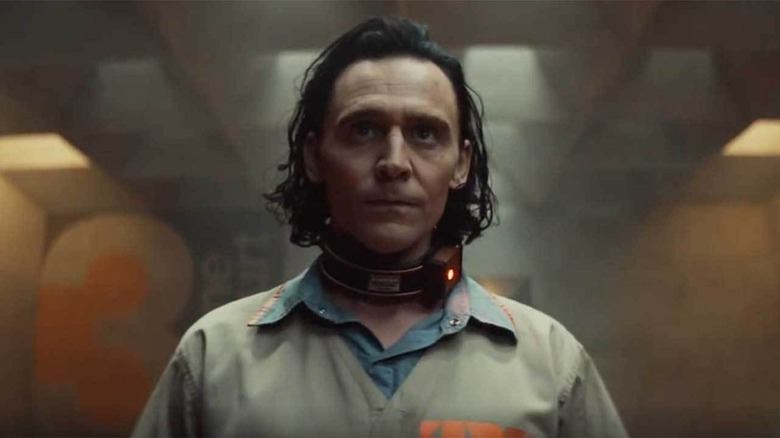
In "Russian Doll," Nadia's life flashes before her eyes again and again in an endless time loop. In Disney Plus' "Loki," the Norse god's life is played back for him for just a few minutes. Both characters break, emotionally and mentally. Staring into the well of who you are and what you've done yields darkness. There's an oasis past the blackness, but you have to push through the proverbial void to get there.
If that thesis makes "Loki" or "Russian Doll" sound like a slog, you'll be thrilled to learn that neither is. That's one reason fans of the latter should seek the former out. Kate Herron and Michael Waldron's ecstatic "Doctor Who" riff is one of Marvel Entertainment's most satisfying works, equally rich in absurdity and pathos. Like "Russian Doll," it riffs on folklore to tell new stories. Like "Russian Doll," it features a seasoned and celebrated actor doing the best work of their already strong career. Most importantly, it asks if changing one's story is truly possible.
Early Edition
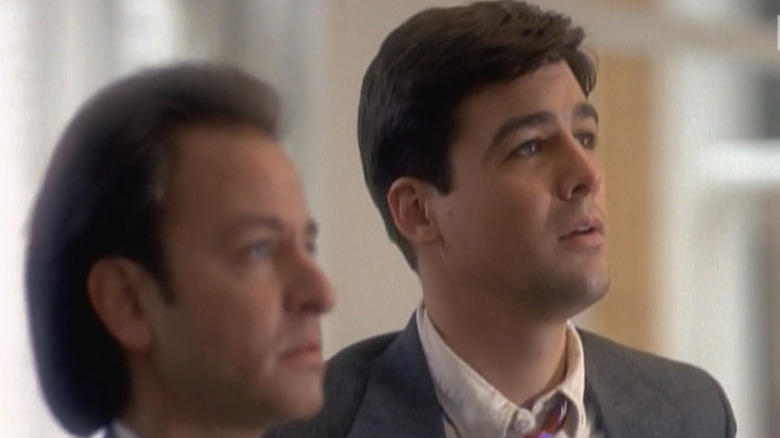
TV shows get resurrected. That isn't a new trend -- it's the norm. From "Family Guy" in 2005 to Full House in 2016, the programs of executives' youths are the clickbait comedies of today's viewers. That sounds cynical, but it's a cosign of CBS' decision to reboot "Early Edition."
For those who don't know, "Early Edition" ran from 1996 to 2000. It starred a pre-fame Kyle Chandler (aka Coach Taylor from "Friday Night Lights"), the reliable Fisher Stevens, and Kristy Swanson, the original "Buffy The Vampire Slayer." It's easily one of the 10 best shows ever set in Chicago. The show follows a journalist named Garry Hobson (Chandler) who starts feeding a stray cat and subsequently receives a paper with tomorrow's post date. Reading of tragedies yet to come, Hobson tries to save as many people as he can before the next day rears its head.
Much like "Russian Doll," "Early Edition" hinges on its irresistible hook and unimpeachable central performance. (The fact that "Edition" didn't make Chandler a household name seems as improbable as any Dillon Panthers victory) Unlike "Russian Doll," "Early Edition" imagines its time-disruption device as a mystery of the week catalyst. While "Russian Doll" is a great New York dinner, "Early Edition" is Second City comfort food. There's room for both on any viewer's plate, and a binge-watch now would prove rewarding if the reboot pilot starring Alice Eve goes to series. Fingers crossed.
Living With Yourself
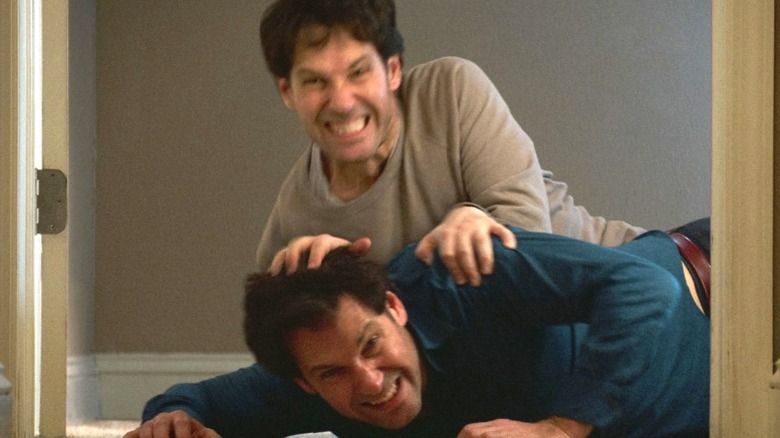
Paul Rudd and Natasha Lyonne have more in common than they appear to. If Lyonne has spent her career toeing the line between New York chaotic good and New York chaotic neutral, Rudd is Hudson Valley chaotic good which can suddenly shift to evil (see Apple TV+'s "The Shrink Next Door"). Both share impish sensibilities, particularly on the late-night TV circuit, and both have survived the transition from teen star to adult actor, actively occupying space in audiences' past and present. For this list, however, the most important trait that Lyonne and Rudd have in common is a Netflix comedy with genre elements that grow sinister over time.
Lyonne's "Russian Doll" was both celebrated and widely viewed. In contrast, Paul Rudd's "Living with Yourself" struggled to achieve liftoff. That's no fault of Rudd, who gave a Golden Globe-nominated performance as Miles Elliot, a burned-out man who undergoes an experimental treatment and gets replaced by a better version of Miles Elliot (also Rudd). Despite the show's many accolades, it has yet to be renewed for a second season.
Oddly enough, that might make it appealing to viewers of "Russian Doll." Besides the show's shared stylistic DNA, "Living with Yourself" is comprised of eight episodes unfolding in under four hours. It's packed with world-building and head-spinning developments. More often than not, it anchors itself in one of Hollywood's finest actors. Like Rudd and Lyonne, it deserves to be seen.
TImeless
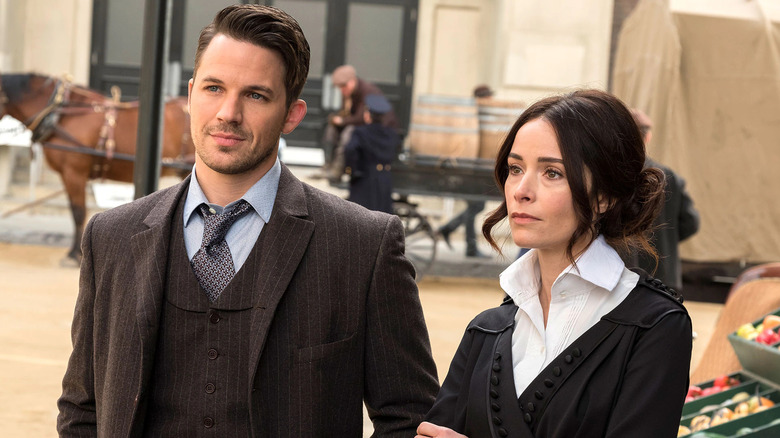
In Season 2 of "Russian Doll," Nadia is a time prisoner. That's what the show's second season trailer emphatically confirmed when it dropped in early April 2022. Instead of trapping its lead in the same day over and over again, it will send her to different decades. It's a neat plot twist that underlines why time loop and time travel stories are close cousins. In both, the flow of life holds protagonists captive against their will. They struggle to get back home, to return to an everyday existence where the whirligig of time still ends in eventual death. As Loki observed in his time travel tale, stories of temporal placement matter because they acknowledge that nothing matters. The journey is futile. The journey is the point.
Few shows understood this better than NBC's "Timeless." The cult hit ran for only two seasons but earned a special two-part finale post-cancellation thanks to fan fervor. Erik Kripke ("The Boys") and Shawn Ryan ("The Shield") developed an irresistibly pulpy premise (a history professor, a soldier, and an engineer fight a mysterious organization across centuries over the fate of time itself) and populated it with incredible actors, including Abigail Spencer and Goran Višnjić. The show travels to Nazi Germany, the California Gold Rush, and other landmark moments. Its journey is the point, and it's a must for "Russian Doll" fans.
Day Break
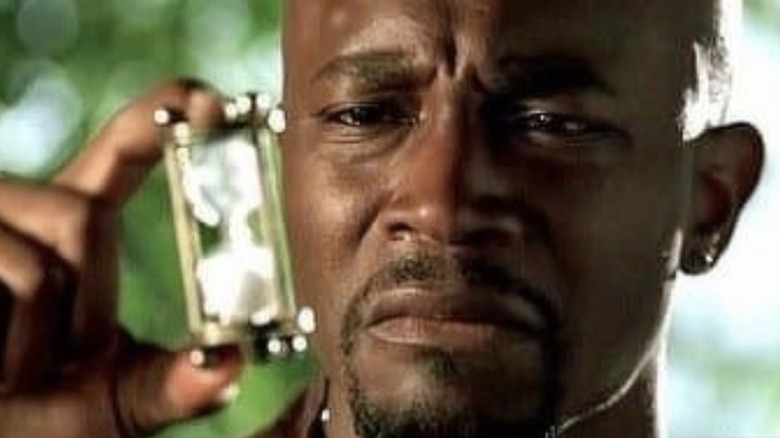
A movie or show's Rotten Tomatoes aggregate can speak volumes. A viral tweet from two years ago highlighted the gulf between critics and audiences where arthouse horror like "Annihilation" and "It Comes At Night" is concerned. Conversely, "Hook" has a 29% "rotten" rating and a 76% audience score. "Day Break," which aired on ABC for one season in 2006, is closer to "Hook" than "Annihilation." The Paul Zbyszewski-created series starred Taye Diggs as Brett Hopper, a Los Angeles detective framed for the murder of an upstart district attorney. Hopper then repeats the day of this framing over and over again, struggling to figure out who's incriminated him.
In many ways, "Russian Doll" pokes fun at "Day Break" and its stone-faced ilk. Hopper is as capable and strapping as any network TV police detective, and his archetypally heroic bona fides are a far cry from Nadia's shaggier personality and approach to detective work. That said, both the roles of Nadia and Harper are ideal vehicles for the performers who play them. Diggs is in excellent form throughout "Day Break," showing the kind of dramatic chops he sharpened to a razor's edge in John Singleton's "Baby Boy." The show is also more playful than it appears at first glance. Hopper's injuries carry over from day to day (a deviation from standard time loop storytelling) and Zbyszewski's work on "Lost" informs the layered mystery-building "Day Break" traffics in. It's worth seeking out, regardless of its Rotten Tomatoes score.
What We Do In The Shadows
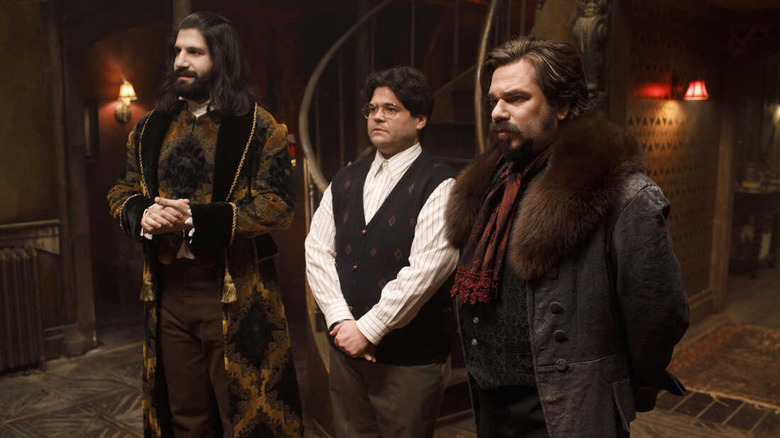
Early on in "Russian Doll," Nadia (Natasha Lyonne) sees a wasted Alan (Charlie Barnett) making a mess of food products in a bodega. She approaches him with care. As she does, we hear two dudes conversing in the deep background, one of whom utters this gem: "I talk to my sister all the time, and she thinks your hot." It's a perfect "overheard in New York" moment, one of many quintessentially New York moments Russian Doll catches in its storytelling web. The show is for audiences who love New York or wonder what the heart of New York is like. Any genre elements which appear on top of that are icing on the cake.
That's also true of FX's "What We Do in the Shadows," the vampire comedy that's arguably the most consistently funny show on television. Jermaine Clement's small screen adaptation of his 2014 film (co-written with Taika Waititi) is set in Staten Island, New York City's odd borough out. An early episode wrings laughs from a local council meeting. When the vampires travel to Manhattan, the city vampires are irritatingly one-percenter and club kid-like. Anyone who's spent time in the Big Apple will recognize and draw joy from the city's portrayal in "What We Do In The Shadows," and its collision of horror comedy and New York travelogue make it ideal for "Russian Doll" fans, too.
Terriers
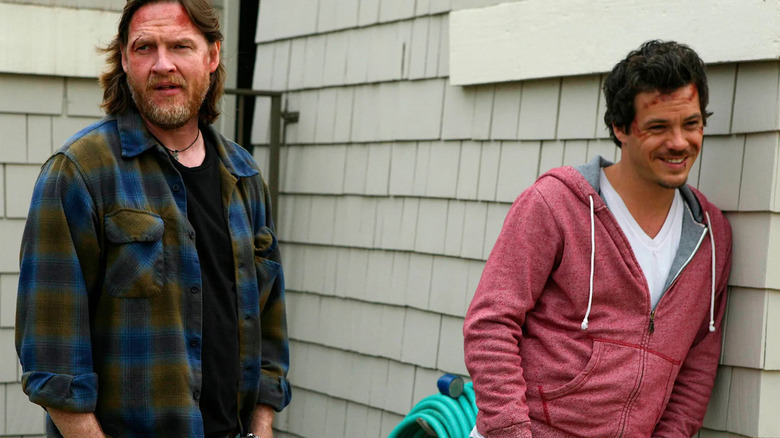
Shortly after "Russian Doll" caught the zeitgeist's attention, fan casting for a proposed "Columbo" reboot began to circulate. The most popular name? Natasha Lyonne. It almost makes too much sense. Lyonne has the uncanny ability to convey bumbling bemusement and whip-smart intellect simultaneously. She can get the best of herself and others in a single breath. "Russian Doll" is nothing if not a backdoor audition for the detective Peter Falk made universally beloved, and the fact that Lyonne is now starring in a Rian Johnson-created private eye series only seems to back that notion up. It's also why "Russian Doll" fans should seek out "Terriers."
"Terriers" is too gritty to be considered a "Columbo" successor. Yet, the Ted Griffin-created show is a close cousin to it. The story of two down-and-out, unlicensed private investigators who stumble onto a conspiracy far beyond their pay grade, "Terriers" was named IGN's "Best New Series" of 2010 and finished on several "best of" lists, yet the show was canceled after just one season. As it stands, "Terriers" is a near-perfect detective fiction miniseries that's rich in one-of-a-kind characters. It also has a genuinely surprising plot (the episodes directed by the previously mentioned Rion Johnson are particularly mind-blowing). Like "Russian Doll," it's game-changing television that's mysterious, pulpy, and endearingly scrappy above all else.
Gravity Falls
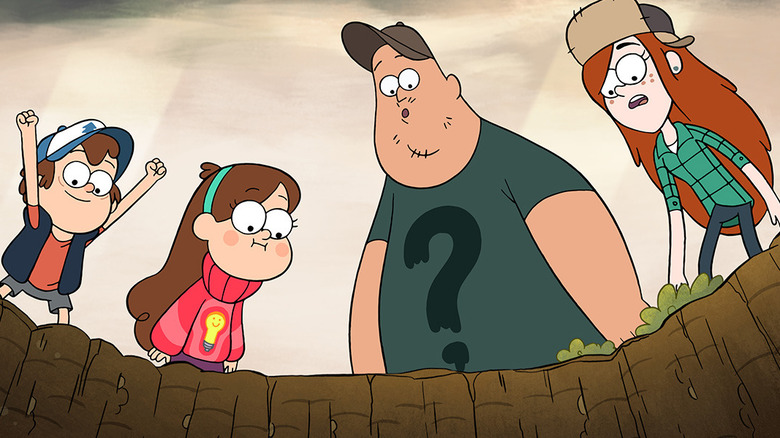
"Russian Doll" is not a show that hinges on cultural mythology. It also wouldn't work without cultural mythology. As Sophie Gilbert adroitly broke it down for The Atlantic, Lesley Headland's series is packed with textual clues that hint at its themes and larger aims. The recurrent use of Harry Nillson's "Gotta Get Up" is just one delicious example ("Russian Doll" examines Nadia's relationship to addiction. "Gotta Get Up" is a song about wanting to party less, written and performed by a man who lost his life to addiction at the age of 52). Similarly, "Russian Doll" hints at in-show mythology which informs its time loops (Season 1) and time travel (Season 2).
All of which is to say that if you adore "Russian Doll" for both its mythos and characters, "Gravity Falls" is an oddly great companion piece. In many ways, the shows are nothing alike. As a baseline, Alex Hirsch's Disney XD epic is for audiences of all ages whereas "Russian Doll" is decidedly not. Still, few shows in the 21st century have been more packed with thematically solvent history than "Gravity Falls," which uses the Mystery Shack and its mystery box show conventions to drive Dipper, Mabel, and Grunkle Stan to the emotionally rewarding ending each deserves. It seems like the show that young Nadia deserved as a child. "Gravity Falls" is never less than witty, surprising, and deeply respectful of its audience's intelligence. It's a must-watch.
Search Party
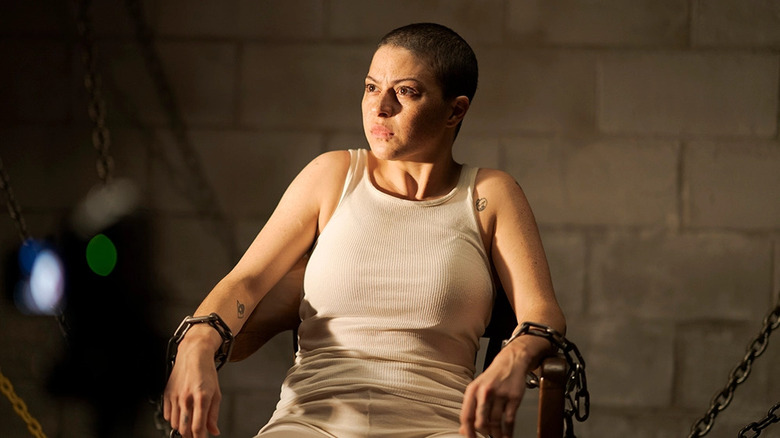
"Russian Doll" appropriately has stories within stories. The primary plot is a dark, time-loop comedy about two disparate people's change and growth. The story within that story takes New York millennials and their culture to task. It's a blast. Anyone who's been to a party in any city in America knows that the shindig at Maxine's apartment is a masterful representation of 2020s life as we know it. In a phrase, it's fantastic.
Fans of anything occurring within Maxine's apartment would be wise to check out HBO Max's "Search Party." The brainchild of Sarah-Violet Bliss and Charles Rogers, "Search Party" evolved from an evisceration of New York millennials in the form of a detective story to an evisceration of the millennial period with shocking genre elements. "Search Pary" cements its cast of alternative comedy talent as TV heavy hitters. There's shared DNA in the work John Early and Greta Lee are doing — ditto Brandon Michael Hall and Ritesh Rajan. Part of the joy of watching television is discovering fresh talent and seeing stars made in real-time. That's a pleasure both "Russian Doll" and "Search Party" provide. It's worth streaming them both.
Dead To Me
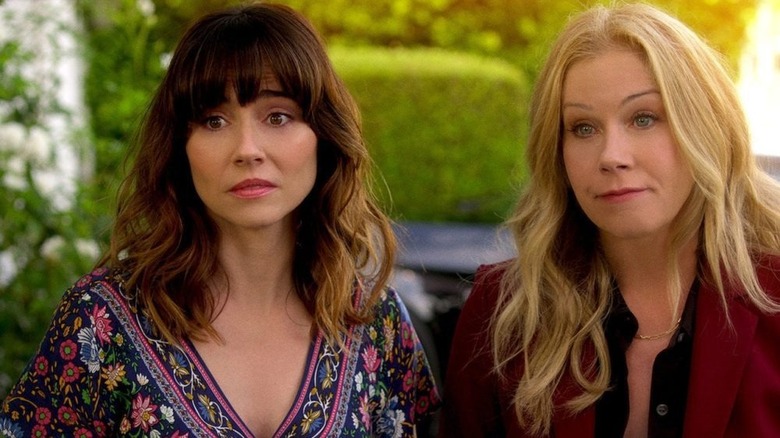
"Russian Doll" does not position itself as a show about female friendship. Its core connections are the nebulously intimate and Aristotelian bonds between Nadia and Alan and the generationally traumatic link that ties Nadia to her mother. There's tons of wonderful female friendship in "Russian Doll, but it doesn't get the spotlight. We are shown why Lizzy (Rebecca Henderson) and Nadia have been close for decades, and we feel the depth of sadness that informs Ruth (Elizabeth Ashley) and Nadia's warm rapport. The snippets that yield these moments are brief but crystalline.
Viewers who responded to them would be wise to check out "Dead to Me," a genre hybrid if there ever was one. The story of two women (Christina Applegate and Linda Cardellini) who suffer tragic losses and wind up embroiled in investigations and cover-ups, Liz Feldman's tragicomedy lands gut-punches without ever getting cloying. Jen (Applegate) and Judy's (Cardellini) bond is as spiky as it is sincere. And the show's nuanced portrait of ties that bind never feels so personal that it isn't broadly appealing. Add in surprising turns from James Marsden, Natalie Morales, and Ed Asner and you have a show that "Russian Doll" fans should stream.
Dark
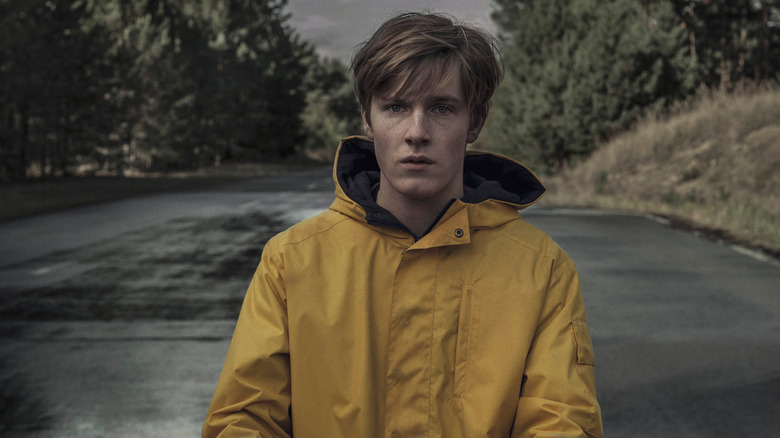
All genres are a template for tonal experimentation. Horror, a storytelling style whose aim is to frighten, can still be hysterical, sad, or wonder-filled. "Russian Doll" found space for scares among its absurd comedic riffs and portraits of New York living, so there's no telling what it will mine from the time travel sub-genre. In the past few years, stories of being sent to another era have been operatic blockbusters ("Avengers: Endgame"), sleazy action shoot 'em ups ("Boss Level"), and poignant social commentaries ("See You Yesterday"). The genre is "Russian Doll's" oyster, not its albatross.
Case in point: "Dark," which also airs on Netflix and has used the trappings of time travel to tell a multigenerational epic unlike any other. The German import was initially compared to "Stranger Things." That comparison does "Dark" and "Stranger Things" a disservice. Where the latter is a readily accessible riff on Spielberg and VHS horror, "Dark" is a deliberately dense and confusing bildungsroman that doubles as popcorn entertainment. It involves time travel, but sharing how would spoil the fun of it. There's no promise that "Russian Doll" and "Dark" share DNA besides their network and the genre they riff on, but it's a blessing to audiences that their quality is similar.
Alice In Borderland
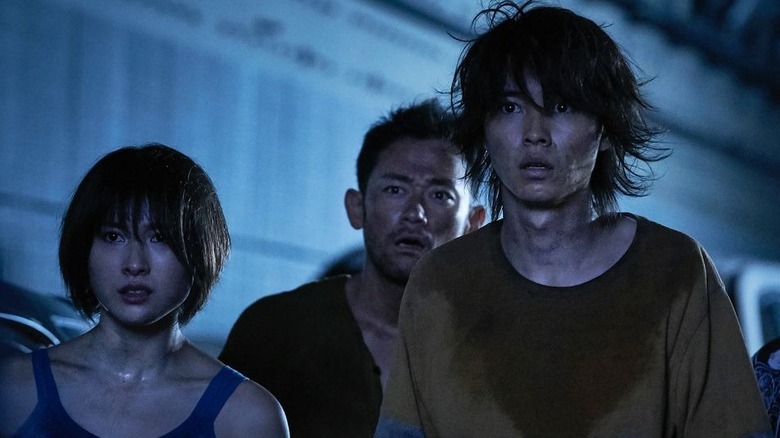
Nadia's job as a video game developer is arguably the least fleshed-out element in "Russian Doll," and it would need bulking up if the primary story weren't so muscular. For those intrigued by game makers who double as protagonists, there are two solid options: Apple TV+'s "Mythic Quest" (one of the two best workplace comedies on TV) and Netflix's "Alice in Borderland." Despite being not quite as funny as "Russian Doll" (really, a show that's rarely funny), it's the one to recommend to fans of Nadia and Alan's adventures.
As video games present an answer and escape for Nadia and Alan's uncanny situation, so do they for the protagonists in "Alice in Borderland." This Japanese import concerns an obsessive gamer named Arisu (Kento Yamazaki), who suddenly finds himself in a desolate version of Tokyo with his friends. The group must then participate and survive a series of dangerous games for unknown reasons. It's like "Saw" but by way of both "The CW" and "Reboot" with a "Russian Doll" sense of quirk and visual flare. If the more thrilling aspects of "Russian Doll" linger in your imagination, "Alice In Borderland" is a worthy and intriguing follow-up.
Read this next: The 15 Best Netflix Original Series Of 2021 Ranked
The post 14 Shows Like Russian Doll You Should Check Out appeared first on /Film.

